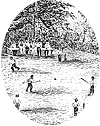Club of Houston
| Nick Name | Houston |
|---|---|
| Earliest Known Date | Thursday, April 4, 1861 |
| Last Known Game | |
| Location | Houston, TX, United States |
| Modern Address | |
| NABBP Status | |
| Nine Class | |
| Tags | |
| Description | The Houston Base Ball Club was formed April 4, 1861, a week before the firing on Fort Sumter. The founders held their meeting "over J. H. Evans' store" [now, 315 Main St.] and (according to the newspaper article) elected the following officers: F. A. Rice, President; E. H. Cushing, VP; W. H. Campbell, Secy.; J. H. Evans, Treasurer; John S. Clute, Corresponding Secy.; G. A. Ellsworth, J. C. Baldwin, C. C. Clute, Directors. [Houston Weekly Telegraph, April 11, 1861, April 16, 1861] Same April 9, 1861 has an ad (dated April 6) for this BBC. Says they are to practice Mondays, Wednesdays and Fridays at the "Academy Square." This undoubtedly refers to the Houston Academy grounds, of which William Marsh Rice was an incorporator. The Academy was bounded by Capitol Ave., Austin St., Rusk Ave. and Caroline St. Modern address: 790 Austin St. The Galveston Weekly News, June 11, 1861: "Two Base Ball clubs are now organized in Houston." Of the founders: Frederick Allyn Rice (1830-1901) was the younger brother and business partner of William Marsh Rice, who endowed Rice University. William, born in Massachusetts, was reputed to be the wealthiest man in Texas prior to the Civil War, running a business empire with his younger brother and with E. B. Nichols. Fred served as captain of a local defense unit during the Civil War. Afterwards he engaged in various business enterprises in the Houston area. Edward Hopkins Cushing (1829-79), born in VT, came to Texas in 1850. He used his Dartmouth education to help edit a newspaper in Houston. Despite his northern birth, he was very pro-secession and after the Civil War was a vocal foe of Reconstruction. Jonas Cutler Baldwin (10-10-1829 4-18-1905) was born in NY, and was son of Horace Baldwin (1801-50), Mayor of Houston. His sister married Fred Rice. From 1857 to 1861 he sold furniture at the store of his brother in law Fred Rice. A quartermaster, CSA. Postwar he ran a grocery store, and later a livery stable, in Houston. He is buried in Houston's Glenwood Cemetery. Joseph H. Evans (1836 2-3-1863) was the son of Henry Evans, a MA-born druggist who worked in Houston by 1850. Joseph ran a dry goods store at 315 Main St. During the war, he enlisted in Waul's Legion, and was promoted to adjutant of the infantry battalion of the Legion. He died of disease in Yazoo City, MS. William Henry Campbell (2-22-1840 1901) was a "clerk" in 1860 Houston. Born in TX, son of MS-born planter Giles M. Campbell, he was raised in New Orleans by his stepfather, Thomas V. Mortimer. During the war he was Sgt. of Waul's Legion, and taken prisoner at Vicksburg in 1863. Postwar he moved to NYC, and was a bookkeeper there in 1870. John Stillwell Clute (6-15-1840 3-3-1929) was born in Ontario, Canada and grew up in Kingston. He moved to Houston in 1860 to become Secretary of the Texas Telegraph Company. He returned to Canada a few months after the war broke out. Later in life he was a prominent merchant in Vancouver, British Columbia. He died there and is buried in Fraser Cemetery, New Westminster. Charles C. Clute (9-26-1828 10-8-1906) is John S's brother. Born in Canada, he was in 1861 Supt. of the Texas Telegraph Company. During the Civil War he served as Captain and Quartermaster in the Confederate army. After the war he moved to Illinois. He died in Chicago and is buried there in Oakwoods Cemetery. George A. Ellsworth (1843-99) is perhaps the most famous of all the early Houston directors. The Canadian-born Ellsworth worked as a telegrapher for the Clute operations. During the Civil War he put his telegraph expertise to work for the Confederate cause, winning worldwide fame as "Lightning" Ellsworth. He joined Morgan's KY Cavalry and was used by Morgan to send telegraph messages to confuse the Union army about Morgan's movements. After the war Ellsworth practiced his trade all over the south, finally dying near Baton Rouge, LA. |
| Sources | Houston Weekly Telegraph, April 9, 11, 1861, April 16, 1861 |
| Source Image | [[Image:|left|thumb]] |
| Has Source On Hand | No |
| Comment | An article in PSOT April 27, 1861 says this club was formed on the 4th. Edit with form to add a comment |
| Query | Edit with form to add a query |
| Found by | Bruce Allardice |
| Submission Note | |
| Entered by | Bruce Allardice |
| First in Location | Houston, TX |
| First in Location Note | |
| Entry Origin | Sabrpedia |
| Entry Origin Url | |
| Local-Origin Study Groups | |
| Has Supplemental Text |
Ballgames
No games have been posted for this Club yet.
Players
No players have been associated with this Club yet.
Playing Fields
| Field | Years | Edit Association with Club |
|---|---|---|
| Academy Square | 1861 |
Comments
<comments voting="Plus" />
